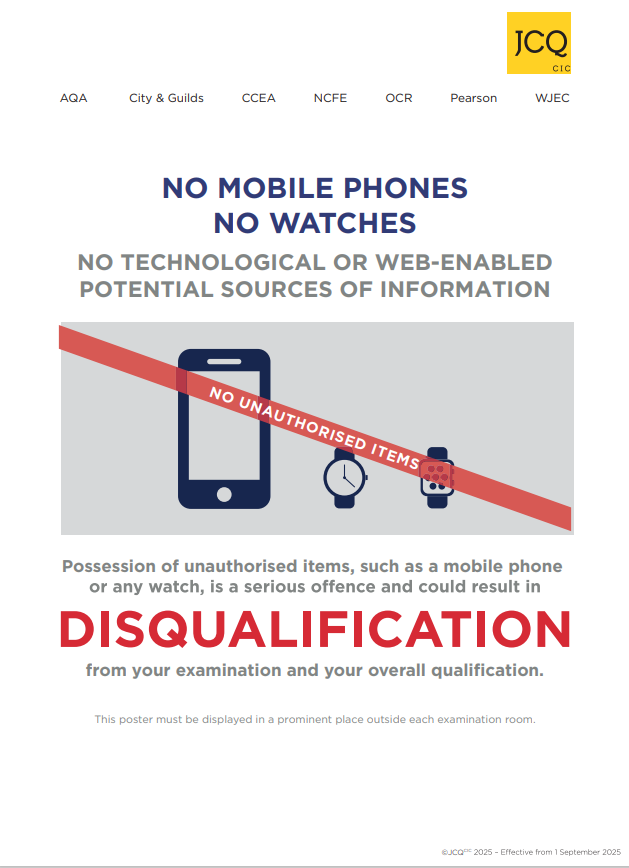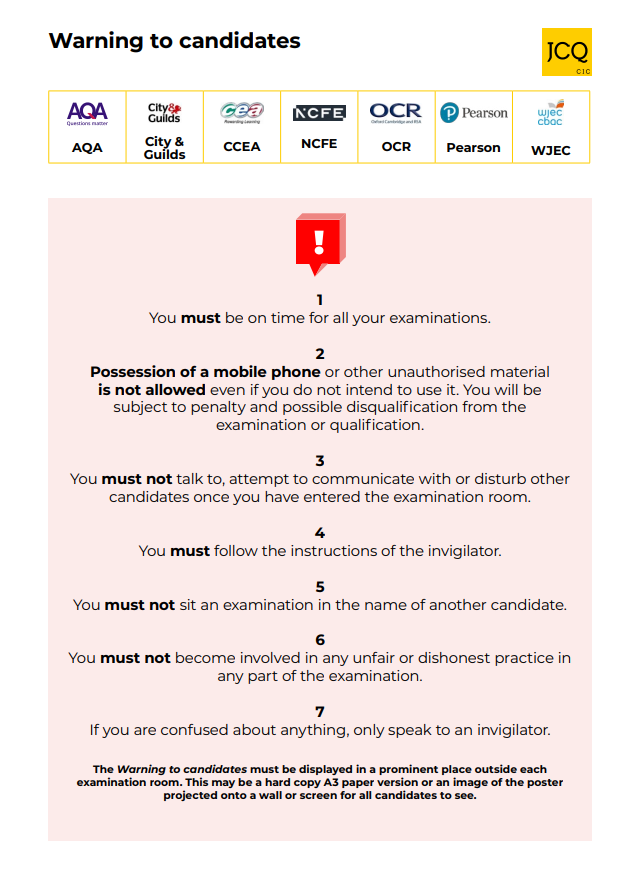Exam Time
There is a lot of information to be aware of when taking examinations.
Ofqual has published a student checklist to help students prepare for their assessments. We’d also recommend Ofqual’s recently published Student Guide 2025, which gives students information about this year’s arrangements for qualifications and explains what support is in place when taking exams and assessments.
There is also more useful information here - Key information for candidates and parents/carers (Summer 2025)
Exam advice by Jada Bennet (May 2025)
Before the day
Paper versions of the timetable and ID cards will be distributed closer to the exams, together with ID cards during form. 6th form students are expected to bring their lanyards to all of their exams.
Timetables can also be viewed through the Arbor Portal. Candidate lists can be found outside the exams office to check the room or seat number on the day of the exams.
Exam rooms that are used:-
- SH - Sports hall
- YC, YC3, YC4 - Youth centre
- SHR - Sports auxiliary room
- GSC - 6th form group study area
- N Rooms - Upstairs in the 6th form building
We sometimes use small exam rooms, if unsure of the exam room location, please speak to us in the exams office located in the youth centre.
Exam Access Arrangements
Access arrangements in secondary schools are reasonable adjustments to exams and assessments to ensure students with special educational needs, disabilities, or temporary injuries can be assessed fairly. These arrangements do not change the exam's content but rather provide support, such as extra time, a scribe, or use of assistive technology like a laptop. Schools assess a student's needs to determine appropriate arrangements based on their "normal way of working" and apply to the Joint Council for Qualifications (JCQ) for approval.
For more information please follow this link - JCQ
Guidance for parents, carers and students about access arrangements.
- Extra time: to complete the exam, normally 25% extra
- Supervised rest breaks: the exam is paused and restarted when the candidate is ready to continue
- Laptop
- Modified exam materials, such as large print or Braille papers
- A scribe or reader: to write down answers or read questions aloud
- Identification of need: Teachers identify students who may be at a disadvantage in exams and inform the school's Special Educational Needs Coordinator (SENCO) or SEND team.
- Assessment: The school's assessor conducts a standardized assessment to gather evidence of the student's needs. This assessment considers the student's "normal way of working".
- Application: If the evidence meets the criteria, the school applies to the JCQ Joint Council for Qualifications for the specific arrangements.
- Approval: The exam boards grant approval for the arrangements based on the evidence provided and JCQ guidelines.
- Implementation: The approved arrangements are put in place for mock exams and then for the final public examinations
On the day
Please remember for every exam session we expect students to:-
- Be 15 minutes early. Students will not be allowed to enter the exam room during the exam announcement, this will be considered late and a sanction will be issued.
- Bring their ID. A sanction will be issued for missing ID.
- Bring all the equipment required for the exam in a clear pencil case, e.g.
- Black ink pens
- Pencils
- Approved calculator
- Other maths equipment; ruler, protractor, compass
- The invigilators only have limited supplies of basic equipment to borrow. A sanction could be imposed for missing equipment.
- Please be aware exam conditions apply as soon as you enter the exam room, please refer to Information for Candidates. Full details of all the exam regulations can be accessed on Sharepoint. A sanction could be applied for any form of communication once you enter the exam room.
- Hand in all electronic equipment e.g. phones, headphones, watches, smart glasses etc
In addition:
- Toilet breaks will not be permitted where the exam is 1 hour and 45 minutes or less, unless in possession of a toilet card.
- Students will not be permitted to wear outdoor clothing during their exam, e.g. coats, hats, scarves etc
- You are allowed to bring in water to the exam, but this must be in a clear bottle, with the label removed. We will only provide water in exceptional circumstances.
Expectations
Entering the exam room
JCQ regulations state that candidates are under formal examination conditions from the moment they enter the room in which they will be taking their examination(s) until the point at which they are permitted to leave.
Formal examination conditions mean that candidates must not talk to, attempt to communicate (verbally or non-verbally) with or disturb other candidates once they have entered the examination room. If they do, the centre must report this to the relevant awarding body.
This is reinforced in the Warning to Candidates poster which the centre will make candidates aware of ahead of an exam series and which is also displayed in a prominent place outside each examination room for all candidates to see before they enter the room.
Candidates must not open the question paper until the examination begins. If they do, the centre must report this to the relevant awarding body.
Instructions in the exam room
Candidates must:
- Always listen to the invigilator and always follow their instructions
- Tell the invigilator if they think they have not been given the right question paper or all of the materials listed on the front of the paper; the question paper is incomplete or badly printed
- Read carefully and follow the instructions printed on the question paper and/or on the answer booklet
- Not start writing anything until the invigilator tells them to fill in all the details required on the front of the question paper and/or the answer booklet
- Not open the question paper until they are told that the exam has begun
- Write their answers in black ink within the designated sections of the answer booklet
- Do their rough work on the proper exam stationery then cross it through and hand it in with their answers
- Make sure they add their candidate details to any additional answer sheets they use
During the exam, it is the responsibility of candidates to tell the invigilator if they feel that their work may be affected by ill health or any other reason.
Malpractice
All those involved in the public qualifications system have a role to play in supporting the appropriate delivery of assessments and upholding the integrity of qualifications. Whilst the vast majority of centres, centre staff and candidates do not normally experience any form of malpractice, it is important that all are aware of the risks of malpractice and take steps to prevent it occurring. Where malpractice does occur, it is vitally important that prompt action is taken to safeguard the integrity of qualifications.
JCQ Malpractice and procedures Sep 2025
The following posters are displayed outside the room and are a reminder to students of the regulations that must be followed and the items that MUST NOT be taken into the exam room as this could result in DISQUALIFICATION from your exam and overall qualification.





